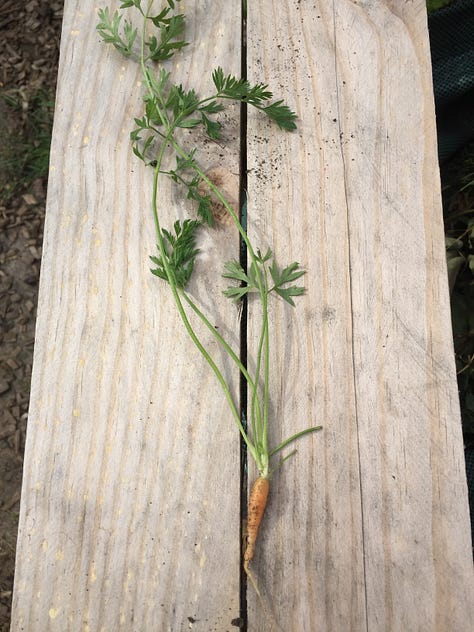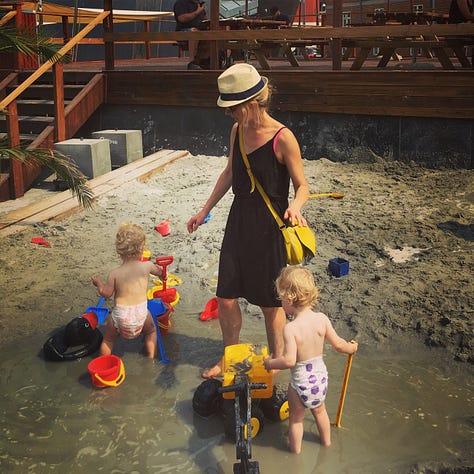Bøvl: How Danes Embrace Trouble (& Why You Should Too)
Why telling children to 'keep out of trouble' and counselling adults to 'steer clear of complications' might just be the worst advice ever. On embracing friction and saying 'yes' to challenges
In many cultures, ‘trouble’ is something to avoid. We tell children to ‘keep out of trouble’ and adults to ‘steer clear of complications’. Yet in Denmark, the word bøvl - or ‘trouble’ - carries a different connotation. Rather than being an undesirable tangle to be avoided, bøvl is seen as an inevitable, often essential and even desirable part of life. Instead of avoiding it, Danes, perhaps unconsciously channelling their Viking forebears, lean into it.
Of course, for many around the world, life is one round after another of incredibly tough times. I acknowledge all my privilege here and how lucky I am to be someone living somewhere that trouble is, largely, optional. But still, I’m making a case for it. For those of us so incredibly fortunate to live somewhere and in circumstances where modern life has made many of our daily interactions largely frictionless…well, then, we might need a bit of bøvl.
‘Bøvl is important - it builds you up as a person,’ says one Danish friend Andreas. When children experience manageable bøvl in early life, he says: ‘we are raising their tolerance for discomfort. Because when they have managed to do a hard thing, they feel good. They feel mastery.’
In the land of Lego and hygge, bøvl is the grit that helps shape the Danish character.
Danes are among the happiest people in the world, but that happiness is not because they avoid bøvl. In fact, they lean into it. Because there’s an understanding that a life without bøvl is no life at all.
The Viking Spirit of Bøvl
To understand this approach, consider the legacy of the Vikings: they crossed vast oceans in open boats, built settlements in harsh climates and solved problems through a mix of grit, ingenuity, sheer determination (as well as some other stuff that’s less laudable…).
Avoiding bøvl wasn’t an option: it was the price of adventure, progress, and sometimes even survival.
This spirit of embracing difficulty is still woven into the Nordic mindset today. Whether it’s tackling an icy bike commute in winter or negotiating a compromise in a town hall meeting, Danes expect life to be complicated. And they’ve found ways to make peace with that, to share the load instead of shouldering it alone.
Bøvl isn’t a nuisance to be done away with - it’s an integral part of learning, growing, and living.
READ: Danish graduation season (aka sailor caps and serious partying)
Friluftsliv: The Outdoor Life
Take friluftsliv, a term that literally means ‘open-air life’ but embodies a deeper philosophy of embracing the outdoors in all its unpredictability. Whether it’s hiking, camping, or sea swimming in the Baltic, friluftsliv is about facing the elements head-on. Bad weather? No problem. Muddy boots and insect bites? All part of the experience.



This approach teaches children (and adults) that nature isn’t a perfectly controlled environment: it’s messy and unpredictable - full of bøvl. But far from deterring Danes from going outside, this unpredictability is what makes friluftsliv so rewarding. The trouble is the point: it teaches resilience, adaptability and self-reliance – all qualities Vikings approve of.
So going for a hike is bøvl. Gardening is bøvl. Growing your own vegetables is bøvl. Ditto camping. And anything involving unpredictable wild animals? (children and household pets included) Ultimate bøvl.
Scouts and Small People: Peak Bøvl
As any caregiver knows, there’s no avoiding bøvl. Toddlers are bøvl black belts. And - niche but true - anyone who’s tried potty training toddler twins will know, life becomes nothing but bøvl for a good fortnight.



…and Danish Scouts are bøvl dialled up to 11.
In the Danish scouting movement, children as young as three are encouraged to build fires, navigate woodland terrain, cook meals on open flames and even construct their own shelters - often with minimal adult interference. The aim isn’t just to teach skills, but to teach that bøvl - the inevitable scrapes, confusion, and mishaps that come with trial and error - is how we learn.
If a knot slips, if a tent collapses, if dinner burns to a crisp - that’s not a reason to give up. It’s a lesson in problem-solving and perseverance. Instead of shielding children from these experiences, scouts (spejder in Danish) are encouraged to wade in and work things out for themselves, fostering independence.
My husband was an ardent scout in pre-health and safety 1990s North Yorkshire. So when he began taking our children to scouts in Denmark? He felt like he’d come home.
Lego Man was fan of bøvl even before he knew the Danish term for it. He always has a DIY project on the go, is regularly covered in paint/sawdust/soot, and the first drafts of all three children’s Fathers’ Day cards all featured pictures of a saw. In Denmark, he was considered…almost…normal.
DIY Culture (aka When Labour Costs Drive Ingenuity)
The embrace of bøvl doesn’t fade away in adulthood in the Nordics. In a region where the cost of labour is high (because, mad idea, everyone gets paid a decent wage), Danes often roll up their sleeves and get stuck in themselves. Whether it’s assembling furniture, tiling a bathroom, or building a deck, my former Danish neighbours may not always have known what they’re doing, but they were willing to give it a go.
This is not mere thriftiness, though that’s part of it. It’s also about satisfaction and sometimes even the honour of wrestling with a project, discovering snags and coming out the other side a little wiser (or at least with a good story).
One Danish friend is currently re-decking his DIY deck after a minor subsidence snafu following a first attempt. But with a bøvl mindset, a tiny setback like subsidence isn’t a reason to call in an expert: it’s an invitation to learn and grow (and occasionally laugh).
The Cultural Payoff
This cultural attitude towards bøvl fosters a sense of competence and confidence that permeates everyday life. When you’re used to tackling trouble, you build up a kind of internal toolkit for navigating the unexpected. That might contribute to Danes consistently ranking among the happiest people on earth: they’ve learned that bøvl is not a sign of failure but a natural, often rewarding, part of life.
It also makes for a more forgiving society, less focused on perfectionism. Because bøvl is expected, mistakes are seen as opportunities - not shameful slip-ups. It’s okay if things don’t go to plan; what matters is how you respond - a lesson worth learning and passing on.
The Bøvl Generation
Children in the Nordics are regularly found to be the happiest in the world, but rather than telling kids to ‘keep out of trouble’, Vikings teach them how to handle it.
In The Anxious Generation, psychologist Jonathan Haidt talks about how we evolved in a physical world full of dangers and opportunities, where children learned to play and explore, largely unsupervised by adults. This allowed children to make their own choices, resolve their own conflicts and learn to take care of one another. They faced difficulties and learned to master them. This, Haidt believed, prepared them to master bigger challenges later on. And it’s this freedom, he believes, that many children these days are missing out on.
READ: Scandinavian sixth sense, Viking gold & coping with the cold
‘Children can only learn how to not get hurt in situations where it is possible to get hurt,’ he wrote in The Atlantic: ‘When parents, teachers, and coaches get involved, it becomes less free, less playful, and less beneficial. Adults usually can’t stop themselves from directing and protecting.’
By leaning into bøvl, Danes teach resilience, creativity and courage. Mini Vikings learn that life is rarely smooth - and that’s okay. They learn that the path to competence is long and winding and frequently bramble-strewn - but that’s what makes us stronger.
Bøvl as a Way of Life
In the UK and the US, friction is often treated as a design flaw to be engineered out. Companies like Amazon can deliver everything from groceries to gym equipment to our doorstep in hours, removing friction from every transaction. Tech giants spend billions on design to make apps ‘frictionless’.
But this backfires. Trouble still finds a way when the broadband goes down. Or the train is delayed. The online order goes missing. And because we’re conditioned to expect seamless service, these minor irritations can spark major frustration. Instead of seeing them as part of the human experience, we see them as a failure.
When we treat bøvl as something to be eliminated, we become less resilient. We see every setback as a scandal, every minor hassle as an affront to our rights. But if we adopt a Danish perspective, bøvl is simply part of life. An approach that prizes effort over perfection, growth over ease, and experience over smooth sailing.
In Denmark, this attitude helps build social trust. If you expect trouble, you also expect that someone will help you handle it. Bøvl creates opportunities for solidarity, for humour, for that quiet, unshowy resilience that keeps Danish society ticking over.
So the next time we encounter bøvl, we should take a leaf out of the Danish playbook. We might just discover that what we thought was ‘trouble’, was actually an invitation-to learn, grow and just…live a little more fully. In the gritty, messy, granular real world.
Until next time, vi ses,
Helen






Just the advice we all need, thank you! I was child-wrangling yesterday (four year old granddaughter) and it was hard to hold back on comments like 'be careful', just a lttle bit and whoa, well never mind we can scrape the glitter off the cushions it'll be fine'.
I had two boys who were as you might expect, rough and tumble, messy, dirty and taking numerous trips to the Minor Injures Unit (they said I should have a loyalty card) but being a Nana, to a little girl, is a whole new ballgame. Her parents let her get dirty, climb and fall, scramble and create and she is turning out to be fearless, confident and sassy. Everything we need our future women to be. So break out the glitter, throw paint about and walk in it, laugh when it gets in your hair. She says 'Don't worry Nana, is OK, we can fix it' My heart sings!
Thank you Helen, this was what I needed to hear today and so very, very true.